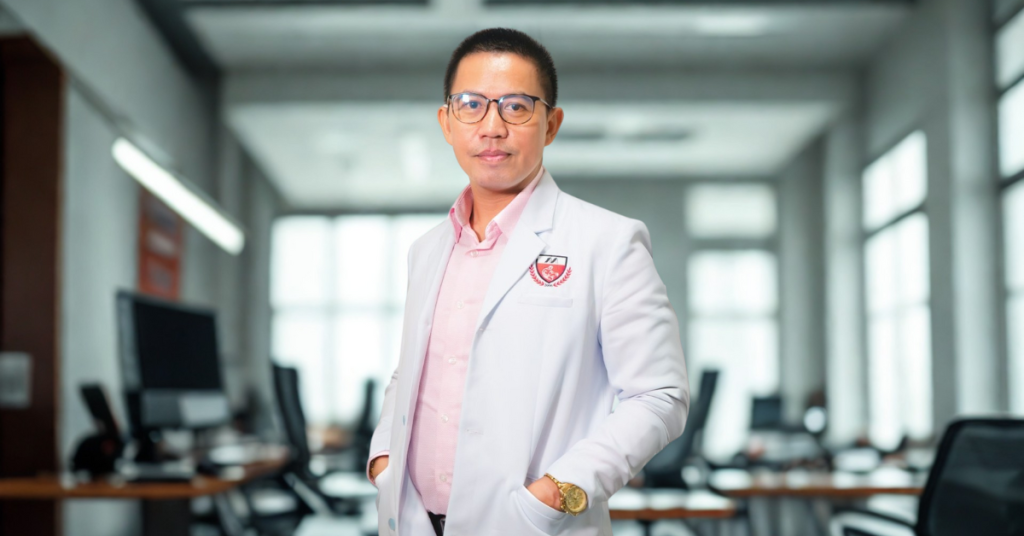When most people think of management consultants, they picture suits, boardrooms, and corporate turnarounds. For Cyruz Tuppal, the path started somewhere very different: in the wards of a hospital.
As a frontline nurse and community health worker, Cyruz was first trained to care for patients at the most human level. But over time, his career expanded far beyond bedside care. He became a faculty leader, an assistant dean for academics and research, and an accreditor with PAASCU, one of the Philippines’ premier quality-assurance bodies. Each step gave him a wider vantage point—not just treating individuals but shaping systems, policies, and institutions.
Building Systems, Not Just Solving Problems
The turning point came when Cyruz realized that the challenges he was facing—whether in higher education or healthcare—were not isolated. They were symptoms of broader systems that needed redesign. His work in Ethiopia, China, and across Philippine universities further deepened that conviction.
By 2025, he decided to formalize his consulting practice. He founded Domus Pio, a boutique firm specializing in research consultancy, leadership development, academic-writing mentorship, futures thinking, and policy advisory. At the same time, he launched the Dr. Cyruz P. Tuppal Review Center, a platform to professionalize licensure coaching and organizational learning for allied-health programs.
For him, the step into consulting wasn’t about changing careers—it was about scaling impact. “Whether in hospitals, schools, or government, the questions are the same: How do we design systems that actually serve people? How do we make quality sustainable?”
Lessons Across Sectors
Healthcare, higher education, and public-sector governance have all shaped Cyruz’s consulting lens. Working in hospitals gave him precision and empathy; teaching in universities honed his ability to structure evidence; accreditation exposed him to best—and worst—practices in quality management.
The result is a pragmatic, evidence-based approach. His clients don’t just receive reports—they gain roadmaps with measurable indicators, coaching for staff, and systems that survive beyond the initial project.
“Successful consultants today don’t just hand over deliverables,” he says. “They help institutions become learning organizations, where improvement becomes part of the culture.”
Leadership That Listens
Cyruz’s leadership style blends servant-leadership with systems thinking. He listens deeply, maps realities, then removes friction so people can do their best work.
In his deanship at the University of San Agustin, he applied this philosophy by focusing on faculty enablement before rolling out quality reforms. “Policy is nothing without people,” he explains. “If you don’t bring faculty and staff along, the system collapses.” That insight now anchors much of his consulting work, where he insists on coupling technical frameworks with human-centered coaching.
The Role of Certification
To ground his years of practice in a global standard, Cyruz pursued the Certified Management Consultant (CMC®) credential, completing the program with CMC Philippines in 2021. For him, it was less about adding letters after his name and more about codifying a discipline: clarifying scope, aligning strategy with budgets, and embedding ethics into every project.
“The CMC didn’t change what I do,” he says, “but it gave me language and structure to do it more consistently. It’s a signal to clients that my practice is grounded in both rigor and ethics.”
Looking Toward Public Service
What sets Cyruz apart is how he views consulting not just as a career but as preparation for something bigger: governance. A member of the Health Workers’ Party List, he envisions bringing consulting tools—scope discipline, evidence-based policy, ethical guardrails—into the halls of government.
“Policies often fail not because they lack good intent, but because they lack execution discipline,” he says. “Good governance, like good consulting, means aligning goals, embedding ethics, and monitoring outcomes.”
For Cyruz, the ultimate goal is to create government institutions that function as learning organizations—constantly adapting, innovating, and improving. Whether in healthcare reform, education policy, or fiscal oversight, he believes consultants and policymakers alike must anchor decisions on both evidence and human dignity.
A Mission Anchored in Caring
At heart, Cyruz still identifies with the values that drew him into nursing: care, dignity, and service. His Communion-in-Caring theory underscores that strategy and systems should never come at the expense of people.
“I see consulting and public service as two sides of the same coin,” he reflects. “Both are about helping organizations—and societies—fulfill their purpose without losing sight of the people they exist to serve.”
![]()



